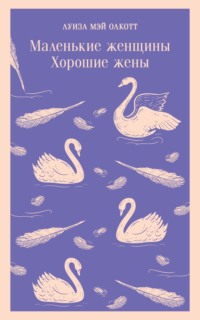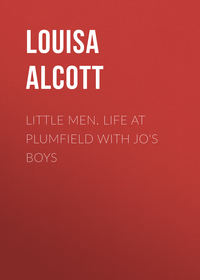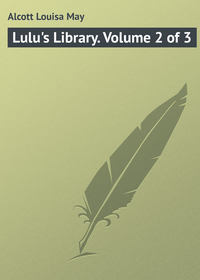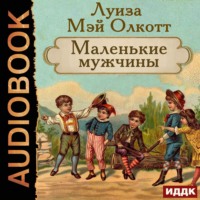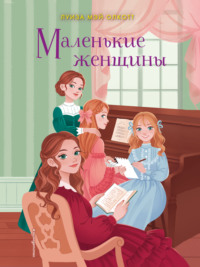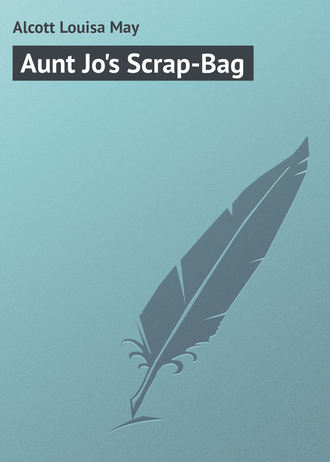 полная версия
полная версияAunt Jo's Scrap-Bag
'What would you buy?' asked Bessy, rubbing her cold hands, and longing for her mittens.
'I'd buy a pair of large, warm blankets, a load of wood, a shawl for mother, and a pair of shoes for me; and if there was enough left, I'd give Bessy a new hat, and then she needn't wear Ben's old felt one,' answered Tilly.
The girls laughed at that; but Bessy pulled the funny hat over her ears, and said she was much obliged but she'd rather have candy.
'Let's look, and maybe we can find a purse. People are always going about with money at Christmas time, and some one may lose it here,' said Kate.
So, as they went along the snowy road, they looked about them, half in earnest, half in fun. Suddenly Tilly sprang forward, exclaiming, – 'I see it! I've found it!'
The others followed, but all stopped disappointed; for it wasn't a purse, it was only a little bird. It lay upon the snow with its wings spread and feebly fluttering, as if too weak to fly. Its little feet were benumbed with cold; its once bright eyes were dull with pain, and instead of a blithe song, it could only utter a faint chirp, now and then, as if crying for help.
'Nothing but a stupid old robin; how provoking!' cried Kate, sitting down to rest.
'I shan't touch it. I found one once, and took care of it, and the ungrateful thing flew away the minute it was well,' said Bessy, creeping under Kate's shawl, and putting her hands under her chin to warm them.
'Poor little birdie! How pitiful he looks, and how glad he must be to see some one coming to help him! I'll take him up gently, and carry him home to mother. Don't be frightened, dear, I'm your friend;' and Tilly knelt down in the snow, stretching her hand to the bird, with the tenderest pity in her face.
Kate and Bessy laughed.
'Don't stop for that thing; it's getting late and cold: let's go on and look for the purse,' they said moving away.
'You wouldn't leave it to die!' cried Tilly. 'I'd rather have the bird than the money, so I shan't look any more. The purse wouldn't be mine, and I should only be tempted to keep it; but this poor thing will thank and love me, and I'm so glad I came in time.'
Gently lifting the bird, Tilly felt its tiny cold claws cling to her hand, and saw its dim eyes brighten as it nestled down with a grateful chirp.
'Now I've got a Christmas present after all,' she said, smiling, as they walked on. 'I always wanted a bird, and this one will be such a pretty pet for me.'
'He'll fly away the first chance he gets, and die anyhow; so you'd better not waste your time over him,' said Bessy.
'He can't pay you for taking care of him, and my mother says it isn't worth while to help folks that can't help us,' added Kate.
'My mother says, "Do as you'd be done by;" and I'm sure I'd like any one to help me if I was dying of cold and hunger. "Love your neighbour as yourself," is another of her sayings. This bird is my little neighbour, and I'll love him and care for him, as I often wish our rich neighbour would love and care for us,' answered Tilly, breathing her warm breath over the benumbed bird, who looked up at her with confiding eyes, quick to feel and know a friend.
'What a funny girl you are,' said Kate; 'caring for that silly bird, and talking about loving your neighbour in that sober way. Mr. King don't care a bit for you, and never will, though he knows how poor you are; so I don't think your plan amounts to much.'
'I believe it, though; and shall do my part, any way. Good-night. I hope you'll have a merry Christmas, and lots of pretty things,' answered Tilly, as they parted.
Her eyes were full, and she felt so poor as she went on alone toward the little old house where she lived. It would have been so pleasant to know that she was going to have some of the pretty things all children love to find in their full stockings on Christmas morning. And pleasanter still to have been able to give her mother something nice. So many comforts were needed, and there was no hope of getting them; for they could barely get food and fire.
'Never mind, birdie, we'll make the best of what we have, and be merry in spite of every thing. You shall have a happy Christmas, any way; and I know God won't forget us if every one else does.'
She stopped a minute to wipe her eyes, and lean her cheek against the bird's soft breast, finding great comfort in the little creature, though it could only love her, nothing more.
'See, mother, what a nice present I've found,' she cried, going in with a cheery face that was like sunshine in the dark room.
'I'm glad of that, dearie; for I haven't been able to get my little girl anything but a rosy apple. Poor bird! Give it some of your warm bread and milk.'
'Why, mother, what a big bowlful! I'm afraid you gave me all the milk,' said Tilly, smiling over the nice, steaming supper that stood ready for her.
'I've had plenty, dear. Sit down and dry your wet feet, and put the bird in my basket on this warm flannel.'
Tilly peeped into the closet and saw nothing there but dry bread.
'Mother's given me all the milk, and is going without her tea, 'cause she knows I'm hungry. Now I'll surprise her, and she shall have a good supper too. She is going to split wood, and I'll fix it while she's gone.'
So Tilly put down the old tea-pot, carefully poured out a part of the milk, and from her pocket produced a great, plummy bun, that one of the school-children had given her, and she had saved for her mother. A slice of the dry bread was nicely toasted, and the bit of butter set by for her put on it. When her mother came in there was the table drawn up in a warm place, a hot cup of tea ready, and Tilly and birdie waiting for her.
Such a poor little supper, and yet such a happy one; for love, charity, and contentment were guests there, and that Christmas eve was a blither one than that up at the great house, where lights shone, fires blazed, a great tree glittered, and music sounded, as the children danced and played.
'We must go to bed early, for we've only wood enough to last over to-morrow. I shall be paid for my work the day after, and then we can get some,' said Tilly's mother, as they sat by the fire.
'If my bird was only a fairy bird, and would give us three wishes, how nice it would be! Poor dear, he can't give me any thing; but it's no matter,' answered Tilly, looking at the robin, who lay in the basket with his head under his wing, a mere little feathery bunch.
'He can give you one thing, Tilly, – the pleasure of doing good. That is one of the sweetest things in life; and the poor can enjoy it as well as the rich.'
As her mother spoke, with her tired hand softly stroking her little daughter's hair, Tilly suddenly started and pointed to the window, saying, in a frightened whisper, – 'I saw a face, – a man's face, looking in! It's gone now; but I truly saw it.'
'Some traveller attracted by the light perhaps. I'll go and see.' And Tilly's mother went to the door.
No one was there. The wind blew cold, the stars shone, the snow lay white on field and wood, and the Christmas moon was glittering in the sky.
'What sort of a face was it?' asked Tilly's mother, coming back.
'A pleasant sort of face, I think; but I was so startled I don't quite know what it was like. I wish we had a curtain there,' said Tilly.
'I like to have our light shine out in the evening, for the road is dark and lonely just here, and the twinkle of our lamp is pleasant to people's eyes as they go by. We can do so little for our neighbours, I am glad to cheer the way for them. Now put these poor old shoes to dry, and go to bed, dearie; I'll come soon.'
Tilly went, taking her bird with her to sleep in his basket near by, lest he should be lonely in the night.
Soon the little house was dark and still, and no one saw the Christmas spirits at their work that night.
When Tilly opened the door next morning, she gave a loud cry, clapped her hands, and then stood still; quite speechless with wonder and delight. There, before the door, lay a great pile of wood, all ready to burn, a big bundle and a basket, with a lovely nosegay of winter roses, holly, and evergreen tied to the handle.
'Oh, mother! did the fairies do it?' cried Tilly, pale with her happiness, as she seized the basket, while her mother took in the bundle.
'Yes, dear, the best and dearest fairy in the world, called "Charity." She walks abroad at Christmas time, does beautiful deeds like this, and does not stay to be thanked,' answered her mother with full eyes, as she undid the parcel.
There they were, – the warm, thick blankets, the comfortable shawls, the new shoes, and, best of all, a pretty winter hat for Bessy. The basket was full of good things to eat, and on the flowers lay a paper, saying, – 'For the little girl who loves her neighbour as herself.'
'Mother, I really think my bird is a fairy bird, and all these splendid things come from him,' said Tilly, laughing and crying with joy.
It really did seem so, for as she spoke, the robin flew to the table, hopped to the nosegay, and perching among the roses, began to chirp with all his little might. The sun streamed in on flowers, bird, and happy child, and no one saw a shadow glide away from the window; no one ever knew that Mr. King had seen and heard the little girls the night before, or dreamed that the rich neighbour had learned a lesson from the poor neighbour.
And Tilly's bird was a fairy bird; for by her love and tenderness to the helpless thing, she brought good gifts to herself, happiness to the unknown giver of them, and a faithful little friend who did not fly away, but stayed with her till the snow was gone, making summer for her in the winter-time.
MY LITTLE GENTLEMAN
No one would have thought of calling him so, this ragged, barefooted, freckle-faced Jack, who spent his days carrying market-baskets for the butcher, or clean clothes for Mrs. Quinn, selling chips, or grubbing in the ash-heaps for cinders. But he was honestly earning his living, doing his duty as well as he knew how, and serving those poorer and more helpless than himself, and that is being a gentleman in the best sense of that fine old word. He had no home but Mrs. Quinn's garret; and for this he paid by carrying the bundles and getting the cinders for her fire. Food and clothes he picked up as he could; and his only friend was little Nanny. Her mother had been kind to him when the death of his father left him all alone in the world; and when she, too, passed away, the boy tried to show his gratitude by comforting the little girl, who thought there was no one in the world like her Jack.
Old Mrs. Quinn took care of her, waiting till she was strong enough to work for herself; but Nanny had been sick, and still sat about, a pale, little shadow of her former self, with a white film slowly coming over her pretty blue eyes. This was Jack's great trouble, and he couldn't whistle it away as he did his own worries; for he was a cheery lad, and when the baskets were heavy, the way long, the weather bitter cold, his poor clothes in rags, or his stomach empty, he just whistled, and somehow things seemed to get right. But the day he carried Nanny the first dandelions, and she felt of them, instead of looking at them, as she said, with such pathetic patience in her little face, 'I don't see 'em; but I know they're pretty, and I like 'em lots,' Jack felt as if the blithe spring sunshine was all spoiled; and when he tried to cheer himself up with a good whistle, his lips trembled so they wouldn't pucker.
'The poor dear's eyes could be cured, I ain't a doubt; but it would take a sight of money, and who's agoing to pay it?' said Mrs. Quinn, scrubbing away at her tub.
'How much money?' asked Jack.
'A hundred dollars, I dare say. Dr. Wilkinson's cook told me once that he done something to a lady's eyes, and asked a thousand dollars for it.'
Jack sighed a long, hopeless sigh, and went away to fill the water-pails; but he remembered the doctor's name, and began to wonder how many years it would take to earn a hundred dollars.
Nanny was very patient; but, by and by, Mrs. Quinn began to talk about sending her to some almshouse, for she was too poor to be burdened with a helpless child. The fear of this nearly broke Jack's heart; and he went about with such an anxious face that it was a mercy Nanny did not see it. Jack was only twelve, but he had a hard load to carry just then; for the thought of his little friend, doomed to lifelong darkness for want of a little money, tempted him to steal more than once, and gave him the first fierce, bitter feeling against those better off than he. When he carried nice dinners to the great houses and saw the plenty that prevailed there, he couldn't help feeling that it wasn't fair for some to have so much, and others so little. When he saw pretty children playing in the park, or driving with their mothers, so gay, so well cared for, so tenderly loved, the poor boy's eyes would fill to think of poor little Nanny, with no friend in the world but himself, and he so powerless to help her.
When he one day mustered courage to ring at the great doctor's bell, begging to see him a minute, and the servant answered, gruffly, as he shut the door, 'Go along! he can't be bothered with the like of you!' Jack clenched his hands hard as he went down the steps, and said to himself, with a most unboyish tone, 'I'll get the money somehow, and make him let me in!'
He did get it, and in a most unexpected way; but he never forgot the desperate feeling that came to him that day, and all his life long he was very tender to people who were tempted in their times of trouble, and yielded, as he was saved from doing, by what seemed an accident.
Some days after his attempt at the doctor's, as he was grubbing in a newly-deposited ash-heap, with the bitter feeling very bad, and the trouble very heavy, he found a dirty old pocket-book, and put it in his bosom without stopping to examine it; for many boys and girls were scratching, like a brood of chickens, all round him, and the pickings were unusually good, so no time must be lost. 'Findings is havings' was one of the laws of the ash-heap haunters; and no one thought of disputing another's right to the spoons and knives that occasionally found their way into the ash-barrels; while bottles, old shoes, rags, and paper, were regular articles of traffic among them. Jack got a good basketful that day; and when the hurry was over sat down to rest and clear the dirt off his face with an old silk duster which he had picked out of the rubbish, thinking Mrs. Quinn might wash it up for a handkerchief. But he didn't wipe his dirty face that day; for, with the rag, out tumbled a pocket-book; and on opening it he saw – money. Yes; a roll of bills with two figures on all of them, – three tens and one twenty. It took his breath away for a minute; then he hugged the old book tight in both his grimy hands, and rocked to and fro all in a heap among the oyster-shells and rusty tin kettles, saying to himself, with tears running down his cheeks, 'O Nanny! O Nanny! now I can do it!'
I don't think a basket of cinders ever travelled at such a rate before as Mrs. Quinn's did that day; for Jack tore home at a great pace, and burst into the room, waving the old duster, and shouting, 'Hooray! I've got it! I've got it!'
It is no wonder Mrs. Quinn thought he had lost his wits; for he looked like a wild boy, with his face all streaked with tears and red ashes, as he danced a double-shuffle till he was breathless, then showered the money into Nanny's lap, and hugged her with another 'Hooray!' which ended in a choke. When they got him quiet and heard the story, Mrs. Quinn rather damped his joy, by telling him the money wasn't his, and he ought to advertise it.
'But I want it for Nanny!' cried Jack; 'and how can I ever find who owns it, when there was ever so many barrels emptied in that heap, and no one knows where they came from?'
'It's very like you won't find the owner, and you can do as you please; but it's honest to try, I'm thinking, for some poor girl may have lost her earnin's this way, and we wouldn't like that ourselves,' said Mrs. Quinn, turning over the shabby pocket-book, and carefully searching for some clue to its owner.
Nanny looked very sober, and Jack grabbed up the money as if it were too precious to lose. But he wasn't comfortable about it; and after a hard fight with himself he consented to let Mrs. Quinn ask their policeman what they should do. He was a kindly man; and when he heard the story, said he'd do what was right, and if he couldn't find an owner, Jack should have the fifty dollars back.
How hard it was to wait! how Jack thought and dreamed of his money, day and night! How Nanny ran to the door to listen when a heavy step came up the stairs! and how wistfully the poor darkened eyes turned to the light which they longed to see again.
Honest John Floyd did his duty, but he didn't find the owner; so the old purse came back at last, and now Jack could keep it with a clear conscience. Nanny was asleep when it happened; and as they sat counting the dingy bills, Mrs. Quinn said to the boy, 'Jack, you'd better keep this for yourself. I doubt if it's enough to do the child any good; and you need clothes and shoes, and a heap of things, let alone the books you hanker after so much. It ain't likely you'll ever find another wallet. It's all luck about Nanny's eyes; and maybe you are only throwing away a chance you'll never have again.'
Jack leaned his head on his arms and stared at the money, all spread out there, and looking so magnificent to him that it seemed as if it could buy half the world. He did need clothes; his hearty boy's appetite did long for better food; and, oh! how splendid it would be to go and buy the books he had wanted so long, – the books that would give him a taste of the knowledge which was more enticing to his wide-awake young mind than clothes and food to his poor little body. It wasn't an easy thing to do; but he was so used to making small sacrifices that the great one was less hard; and when he had brooded over the money a few minutes in thoughtful silence, his eye went from the precious bits of paper to the dear little face in the trundle-bed, and he said, with a decided nod, 'I'll give Nanny the chance, and work for my things, or go without 'em.'
Mrs. Quinn was a matter-of-fact body; but her hard old face softened when he said that, and she kissed him good-night almost as gently as if she'd been his mother.
Next day, Jack presented himself at Dr. Wilkinson's door, with the money in one hand and Nanny in the other, saying boldly to the gruff servant, 'I want to see the doctor. I can pay; so you'd better let me in.'
I'm afraid cross Thomas would have shut the door in the boy's face again, if it had not been for the little blind girl, who looked up at him so imploringly that he couldn't resist the mute appeal.
'The doctor's going out; but maybe he'll see you a minute;' and with that he led them into a room where stood a tall man putting on his gloves.
Jack was a modest boy; but he was so afraid that Nanny would lose her chance, that he forgot himself, and told the little story as fast as he could – told it well, too, I fancy; for the doctor listened attentively, his eye going from the boy's eager, flushed face, to the pale patient one beside him, as if the two little figures, shabby though they were, illustrated the story better than the finest artist could have done. When Jack ended, the doctor sat Nanny on his knee, gently lifted up the half-shut eyelids, and after examining the film a minute, stroked her pretty hair, and said so kindly that she nestled her little hand confidingly into his, 'I think I can help you, my dear. Tell me where you live, and I'll attend to it at once, for it's high time something was done.'
Jack told him, adding, with a manly air, as he showed the money, 'I can pay you, sir, if fifty dollars is enough.'
'Quite enough,' said the doctor, with a droll smile.
'If it isn't, I'll work for the rest, if you'll trust me. Please save Nanny's eyes, and I'll do any thing to pay you!' cried Jack, getting red and choky in his earnestness.
The doctor stopped smiling, and held out his hand in a grave, respectful way, as he said, 'I'll trust you, my boy. We'll cure Nanny first; and you and I will settle the bill afterward.'
Jack liked that; it was a gentlemanly way of doing things, and he showed his satisfaction by smiling all over his face, and giving the big, white hand a hearty shake with both his rough ones.
The doctor was a busy man; but he kept them some time, for there were no children in the fine house, and it seemed pleasant to have a little girl sit on his knee and a bright boy stand beside his chair; and when, at last, they went away, they looked as if he had given them some magic medicine, which made them forget every trouble they had ever known.
Next day the kind man came to give Nanny her chance. She had no doubt, and very little fear, but looked up at him so confidingly when all was ready, that he stooped down and kissed her softly before he touched her eyes.
'Let Jack hold my hands; then I'll be still, and not mind if it hurts me,' she said. So Jack, pale with anxiety, knelt down before her, and kept the little hands steadily in his all through the minutes that seemed so long to him.
'What do you see, my child?' asked the doctor, when he had done something to both eyes with a quick, skilful hand.
Nanny leaned forward, with the film all gone, and answered, with a little cry of joy, that went to the hearts of those who heard it, 'Jack's face! I see it! oh, I see it!'
Only a freckled, round face, with wet eyes and tightly-set lips; but to Nanny it was as beautiful as the face of an angel; and when she was laid away with bandaged eyes to rest, it haunted all her dreams, for it was the face of the little friend who loved her best.
Nanny's chance was not a failure; and when she saw the next dandelions he brought her, all the sunshine came back into the world brighter than ever for Jack. Well might it seem so; for his fifty dollars bought him many things that money seldom buys. The doctor wouldn't take it at first; but when Jack said, in the manful tone the doctor liked although it made him smile, 'It was a bargain, sir. I wish to pay my debts; and I shan't feel happy if Nanny don't have it all for her eyes. Please do! I'd rather,' – then he took it; and Nanny did have it, not only for her eyes, but in clothes and food and care, many times over; for it was invested in a bank that pays good interest on every mite so given.
Jack discovered that fifty dollars was far less than most people would have had to pay, and begged earnestly to be allowed to work for the rest. The doctor agreed to this, and Jack became his errand-boy, serving with a willingness that made a pleasure of duty; soon finding that many comforts quietly got into his life; that much help was given without words; and that the days of hunger and rags, heavy burdens and dusty ash-heaps, were gone by for ever.
The happiest hours of Jack's day were spent in the doctor's chaise, when he made his round of visits; for while he waited, the boy studied or read, and while they drove hither and thither, the doctor talked with him, finding an eager mind as well as a tender heart and a brave spirit under the rough jacket of his little serving-man. But he never called him that; for remembering the cheerfulness, self-denial, honesty, and loyalty to those he loved, shown by the boy, the good doctor proved his respect for the virtues all men should covet, wherever they are found, and always spoke of Jack with a smile, as 'My Little Gentleman.'
BACK WINDOWS
As I sit working at my back window, I look out on a long row of other people's back windows; and it is quite impossible for me to help seeing and being interested in my neighbours. There are a good many children in those houses; and though I don't know one of their names, I know them a great deal better than they think I do. I never spoke a word to any of them, and never expect to do so; yet I have my likes and dislikes among them, and could tell them things that they have said and done, which would astonish them very much, I assure you.
First, the babies, – for there are three: the aristocratic baby, the happy-go-lucky baby, and the forlorn baby. The aristocratic baby lives in a fine, well-furnished room, has a pretty little mamma, who wears white gowns, and pink ribbons in her cap; likewise, a fond young papa, who evidently thinks this the most wonderful baby in Boston. There is a stout, motherly lady, who is the grandma, I fancy, for she is always hovering about 'the dear' with cups, blankets, or a gorgeous red worsted bird to amuse it. Baby is a plump, rosy, sweet-faced little creature, always smiling and kissing its hand to the world in general. In its pretty white frocks, with its own little pink or blue ribbons, and its young mamma proudly holding it up to see and be seen, my aristocratic neighbour has an easy life of it, and is evidently one of the little lilies who do nothing but blossom in the sunshine.



